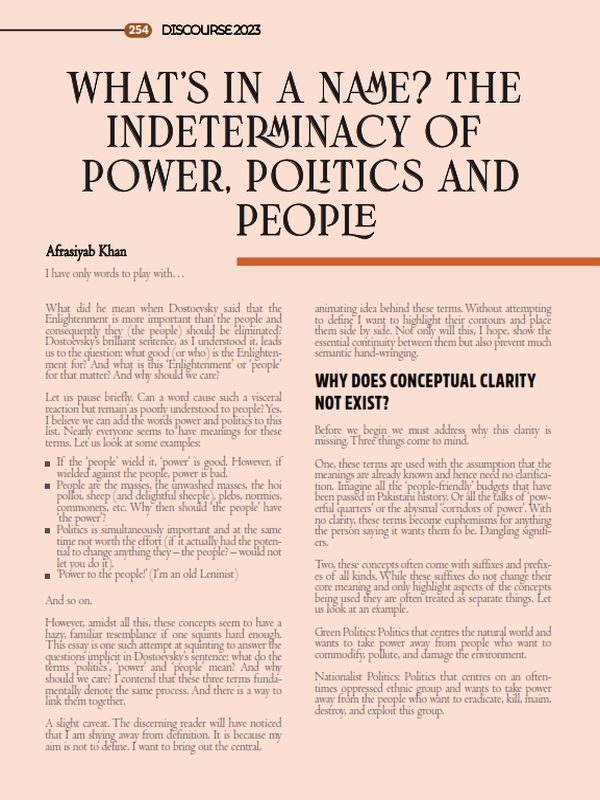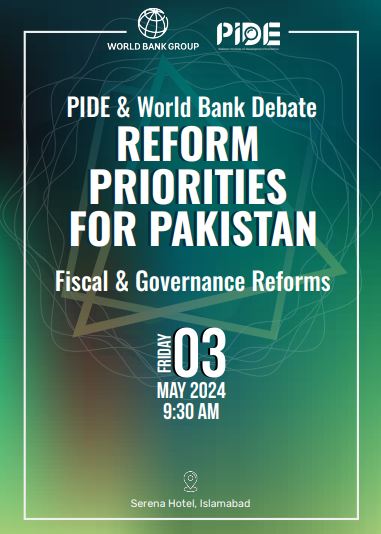What’s in a Name? The Indeterminacy of Power, Politics and People
I have only words to play with…
What did he mean when Dostoevsky said that the Enlightenment is more important than the people and consequently they (the people) should be eliminated? Dostoevsky’s brilliant sentence, as I understood it, leads us to the question: what good (or who) is the Enlightenment for? And what is this ‘Enlightenment’ or ‘people’ for that matter? And why should we care?
Let us pause briefly. Can a word cause such a visceral reaction but remain as poorly understood to people? Yes, I believe we can add the words power and politics to this list. Nearly everyone seems to have meanings for these terms. Let us look at some examples:
- If the ‘people’ wield it, ‘power’ is good. However, if wielded against the people, power is bad.
- People are the masses, the unwashed masses, the hoi polloi, sheep (and delightful sheeple), plebs, normies, commoners, etc. Why then should ‘the people’ have ‘the power’?
- Politics is simultaneously important and at the same time not worth the effort (if it actually had the potential to change anything they – the people? – would not let you do it).
- ‘Power to the people!’ (I’m an old Leninist)
And so on.
However, amidst all this, these concepts seem to have a hazy, familiar resemblance if one squints hard enough. This essay is one such attempt at squinting to answer the questions implicit in Dostoevsky’s sentence: what do the terms ‘politics’, ‘power’ and ‘people’ mean? And why should we care? I contend that these three terms fundamentally denote the same process. And there is a way to link them together.
A slight caveat. The discerning reader will have noticed that I am shying away from definition. It is because my aim is not to define. I want to bring out the central, animating idea behind these terms. Without attempting to define I want to highlight their contours and place them side by side. Not only will this, I hope, show the essential continuity between them but also prevent much semantic hand-wringing.
Why does Conceptual Clarity Not Exist?
Before we begin we must address why this clarity is missing. Three things come to mind.
One, these terms are used with the assumption that the meanings are already known and hence need no clarification. Imagine all the ‘people-friendly’ budgets that have been passed in Pakistani history. Or all the talks of ‘powerful quarters’ or the abysmal ‘corridors of power’. With no clarity, these terms become euphemisms for anything the person saying it wants them to be. Dangling signifiers.
Two, these concepts often come with suffixes and prefixes of all kinds. While these suffixes do not change their core meaning and only highlight aspects of the concepts being used they are often treated as separate things. Let us look at an example.
Green Politics: Politics that centres the natural world and wants to take power away from people who want to commodify, pollute, and damage the environment.
Nationalist Politics: Politics that centres on an oftentimes oppressed ethnic group and wants to take power away from the people who want to eradicate, kill, maim, destroy, and exploit this group.
While allowing for these gross oversimplifications, the idea of politics has not changed by the suffix before it. These are analytical separations.
Finally, these terms are often used with a moral dimension in mind. Power for example is often abused. Politics is often an elaborate pyramid scheme. People are either angelic sufferers or bumbling idiots. Is there a ‘right’ way to do politics? Or a ‘right’ way to use power? More often than not when we talk about these things we imply a ‘right way’ (and that is the one we happen to subscribe to). Morality has always been a right-wing concern and when used only allows us to see through a smudgy glass.
Power
Why, then the world’s mine oyster.
Which I with sword will open.
How to understand power? Given that people have made careers of this the task seems daunting. But in the carefree arrogance of ignorance, I concur that power is the ability to do what one wants in the face of opposition. The greater the ease with which this is achieved the greater the power. This can be done through coercive means or soft power[1]. In all its manifestations the nature of power remains constant. Violence, for example, is not an instance of power but rather a point of weakness because the respective goal has not been achieved and more effort is being exerted. The powers of money, conformity, religion and dare I say knowledge are all essentially this.
Understood in this way there is no abuse of power. Power can only be used. We might disagree with the goals but a massive gathering of people protesting a price hike and an armed battalion opening fire at them are doing the same thing.
Politics
And maybe what they say is true,
Of war and war’s alarms.
Having somewhat understood power let us turn to politics. I begin by saying that politics, as I have understood it, is better explained by using the word siyāsāt. Siyāsāt (from the root words of sāsa) means ‘the training of horses’[2] while politics (from the Greek polítēs) means a citizen. The training of horses is a dynamic process with a clear goal in mind. This teleological dimension is also something that we found in our analysis of power. When viewed together politics then is the distribution of power and the organisation of societies based on access to it. A democratic society is one in which, ostensibly, power is diffuse. An autocratic society is one in which it is concentrated. These are all political systems.
Politics can in this sense be separated from the ‘political process’ which is an outward manifestation of politics itself. An example will help. Pakistan is a country with somewhat regular elections and yet is not a democracy by any stretch of the imagination[3].
Another famous and somewhat poetic definition of politics as the ‘art of the possible’ is also explained when politics is understood to be jostling for power. Therefore, politics is not neutral. Political achievements or reform cannot be neutral. By their very definition, they take power from one group and give it to another. Any act that does not do this is not political and is hollow sound and fury in service of the status quo.
People
Thus the great mass of the French nation is formed by the simple addition of homonymous magnitudes, much as potatoes in a sack form a sack of potatoes.
There is no such thing as the people.
You read this sentence with great derision. You say I am a person and some of my best friends are people. Nonsense you yell. To that, I say bear with me. And also in a whisper, ‘I hope you remember the previous section’.
Humans are not an undifferentiated mass but have always been divided into groups of all kinds. These groups can be classes, ethnicities, genders, etc. Common interests can and do exist[4] but patriarchy, for example, is in the interest of men as a group as opposed to women as a group. Even if patriarchy is ultimately harmful to both of them. Even in this man-group and woman-group, we find differentiation. Using the word people cannot paper over these differences and often the word people is used to disguise the imbalance of power that exists in societies.
Let us imagine a newspaper headline, ‘PEOPLE DON’T PAY TAXES’ with the logline being, ‘People should pay more taxes’. You read it and nod your head in agreement. How true! People should pay more taxes. But when you say people you do not mean yourself or the people that you interact with. After all, you just paid so much in sales tax and did you see the electricity bill? In Pakistan, a country in which the poor subsidise the rich, the wealthiest pay a negligible amount of taxes. It is not the rich that are being hit by these high bills. They can afford to do so. Saying ‘people’ helps them get away with it. It turns specific misery into general malaise. The use of people here refers to some abstraction and is hiding this fact. People-friendly policies are an impossibility in terms. Aesop’s fable of the Man, the Boy and the Donkey was more prescient than we give it credit for. Who is what in that fable I leave to your capable judgement.
So I suggest that instead of people we must refer to the specific group we are talking about[5].
The Relationship Between these Concepts
We have finally reached the end and here I would like to reiterate what has been talked about:
- Power is the ability to do what one wants in the face of opposition.
- Politics is the distribution of power in a society.
- People do not exist. Groups do.
We can now see a similarity between these three things. Let us rewrite it:
Politics is simply the act of taking power from one group and giving it to another. If it has a moral dimension it is only so far as you want to give power to a specific group. This is a dynamic process and can vary across time, cultures, etc.
Right-wing politics, traditionally, has been about maintaining power as it were. In its more modern form, it has acquired a radical dimension and wants to actively take society back to a previous iteration. Left-wing politics is about doing away with the need for politics altogether. Any progressive idea is necessarily negative because it wants to do away with itself.
Finally, why should we care? If we accept politics to be about taking power from one group and giving it to another shouldn’t you want your group to win? ‘We do not say that a man who takes no interest in public affairs is a man who minds his own business. We say he has no business being here at all’.
The author is a researcher interested in gender, development, anthropology, and their intersection.
[1] What a quaint oxymoron. Can power ever be soft?
[2] Horses are more important to our concepts than we think and the reader would do good to look up the etymologies of the words farasat, cavalry, chivalry to name just a few.
[3] By confusing politics with the political process we have ended up making a fetish of the ballot. Elections do not a democracy make.
[4] All experience is universal experience.
[5] The Communist Manifesto would read as a comedy if the word proletariat was replaced with people.





